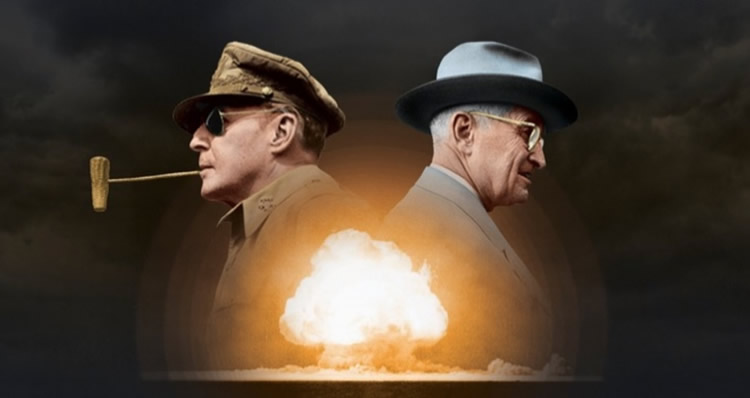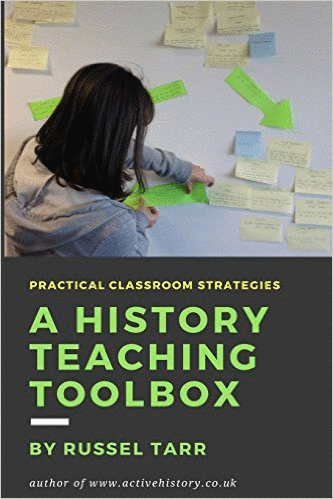World History teaching resources for the high school classroom: lesson plans, worksheets, quizzes and simulation games for KS3, IGCSE, IB and A-Level teachers.
The Korean War (1950-53)
Who was responsible for the outbreak of the Korean War? Was Truman right to commit troops to the conflict?
An online multimedia presentation which places students into the position of members of Truman's National Security Council. The teacher guides the students through a series of decision points and they write up their thoughts on a series of key questions to help them formulate a deeper understanding of the causes of the conflict and Truman's handling of it. Partway through the presentation students will be required to evaluate a series of primary source documents regarding these issues. An additional optional source is extracts from NSC-68.
Students could also / alternatively use the Korean War - Interactive Newsfeed Exercise: Students are presented with a series of "newsfeeds" about the Korean War, which they use to complete this worksheet, and then answer a series of questions.
Historiography: How have historians debated the causes of the Korean War?
Here's a handout I produced for my students, which is particularly useful for justifying the definition of the Korean War as a Civil War for Paper 2 as well as a Cold War Conflict.
Model Essay: Analyse the Causes of the Korean War
A model essay focusing closely on the use of historiography and making particular reference to the role played by the Chinese and the Soviet Union.
Should Truman approve MacArthur's plan to launch an amphibious assault at Inchon?
At the outset of the Korean War, Truman called General McArthur out of retirement to lead the UN forces. MacArthur was a charismatic, complex figure who had served with distinction in both World Wars. Most famously, he had been forced from his military base in the Philippines by the Japanese shortly after the attack in Pearl Harbor declaring “I shall return”. He was as good as his word, leading the ‘island hopping’ campaign across the Pacific and accepting the surrender of Emperor Hirohito of Japan in 1945. With his knowledge of South-East Asia, MacArthur was the obvious choice for the job, although a notoriously prickly character to manage.
Containment or Rollback: Should Truman allow MacArthur to take the war over the 38th Parallel into North Korea?
Students consider nine key primary sources to reach a judgement about whether it would be wise for Truman to take the war into North Korea.

Should Truman support MacArthur and commit the USA to a ‘total war’ in Korea?
Using a variety of sources within a timeline, students decide whether Truman should follow MacArthur's advice and threated retaliation against China unless they withdraw from Korea.
Should Truman tolerate or fire MacArthur for his criticisms?
MacArthur asks Truman to threaten atomic attacks on China if they refuse to withdraw from Korea. Rejecting MacArthur’s advice, Truman refuses to threaten retaliation against China, fearing that this could lead to a Third World War. As a result, MacArthur starts openly criticizing Truman’s policies in interviews with the press...
Truman makes his decision about MacArthur
"Read the following sources, then use them to answer the following question: In your view, do you think that Truman was right to fire General MacArthur? Explain your answer by considering both sides."
How was a truce negotiated? What were the consequences for Korea and for the wider world? | Interactive HTML Hexagons
Students consider a list of detailed points are are then challenged to organise these into meaningful categories to answer the key questions. There are also some HTML5 Hexagons available for this exercise generated at www.classtools.net.
What was the impact of the Korean War on the course and development of the Cold War?
Specifically designed to address a key aspect of the IB syllabus, this provides students with detailed, categorised information and a range of tasks to complete. There are also teacher notes available.
Model Essay: Analyse the causes and consequences of the Korean War
A sample essay written by RJ Tarr of www.activehistory.co.uk. (teacher password required).
Consolidation activities
Podcast: Causes of the Korean War | Student Worksheet | Teacher Notes | Quiz
A key topic for Paper 2 (Cold War Crises and Conlflicts AND Causes, Practices, Effects of War) and Paper 3 Americas (Truman's Foreign Policy)
Podcast: Impact of the Korean War | Student Worksheet | Teacher Notes | Quiz
Korean War: visual essay-writing task
To consolidate their knowledge, 25 political cartoons about the Korean War were shared between the members of the class. Working individually to start with, and then with a partner, they analysed the meaning of each cartoon. Then, collaborating as a group, they decided how best to categorise, link and annotate the cartoons to create a "gallery walk" about the conflict.
Mini-Debates
Students are placed into prosecution and defence teams to analyse Truman's handling of the Korean War. There are some completed teacher notes available for this exercise.
Consolidation activity [2]: Mapwork
Students have to match a range of maps to key moments in the war to consolidate their understanding.
Consolidation activity [3]: Cartoon story analysis
Students take a cartoon story about the war and analyse it for partiality and omissions.
Korean War
Fling the Teacher Quiz
75 possible questions: I like to get all the students playing it
simultaneously, and award 25 points for the first person to finish, 24 for
the next, and so on; over the course of a few weeks you can build up a
"Fling the Teacher Leaderboard" if you play quizzes for different topics!
The Korean War: Interactive Cartoon analysis
Analyse a series of cartoons by hovering over details and answering exam-style questions. When you have finished, the computer will provide you with a printout comparing your answer to a model answer. A great way to revise and develop sourcework skills.
The Korean War: Collapsible Revision Notes
Interactive notes which can be collapsed or expanded to various levels of detail for revision purposes.
25-Question Factual Test
To test knowledge and understanding at the end of the unit (teacher password required).

© 1998-2026 Russel Tarr, ActiveHistory.co.uk Limited (Reg. 6111680)
1 Torrin Drive, Shrewsbury, Shropshire, SY3 6AW, England
Privacy Policy | Contact






